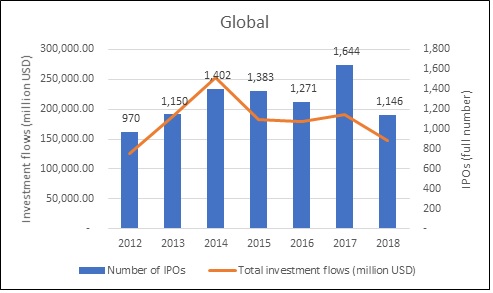
The World Federation of Exchanges has revealed that the global number of Initial Public Offerings and trading in cash equities across parts of the world dipped in the first half of 2023 compared to the same period last year.
WFE, which is the global industry group for exchanges and central clearing counterparties, in a statement, cited various geopolitical and economic tensions that markets experienced during the first half of 2023 as the reason for the decline.
The federation said that compounded by the effects of the war in Ukraine, more financial institutions ran into difficulty with the failure of banks reported in Europe and in the U.S.
It further stated that persistent inflation forced central banks to continue tightening their monetary policy, and consequent interest rate hikes had put pressure on share prices.
“Our data for the first half of 2023 reflects how these tensions have affected markets. Most significantly, we see a decrease in the global number of IPOs and in investment flows when comparing to the same period in 2022, which suggests firms and investors remain cautious. Only a few markets, notably the US, offered a positive trend for these indicators.
“Similarly, trading activity in cash equities decreased across regions, reflecting less interest in participating in the markets. Conversely, we observe an increase in volumes of exchange-traded derivatives, especially in interest rate and commodity contracts, which is consistent with the need for managing the risks and uncertainty derived from interest rate hikes, the geopolitical landscape, and fear of inflation,” part of the statement read.
Commenting on this development, the Chief Executive Officer of WFE, Nandini Sukumar, said, “The first half of the year has been tough for markets and IMF expectations for global growth project a slow recovery. As we enter the second half of the year, eyes will be on the direction of inflation. A decline in inflationary pressures coupled with a decrease in monetary policy tightening would lessen the trends we saw in the first half as we would anticipate more confidence in markets.”
WFE’s Head of Research, Dr Pedro Gurrola-Perez, added “Our new data indicates a slower economic recovery than was expected as geo-political and economic tensions have taken their toll. The decrease in the number of IPOs and in investment flows, in particular, suggests the persistence of the uncertainty that firms and investors faced in the previous year.”
Projecting into the second half of the year, WFE said a decline of inflationary pressures and a slowdown in monetary policy tightening may contribute to moderate the above trends.
However, global growth is still projected by the IMF to fall from an estimated 3.5 per cent in 2022 to 3.0 per cent in both 2023 and 2024.
“If these projections are correct, we anticipate that it will probably not be until the end of 2024 until we will see a reversion in these trends,” WFE concluded.




